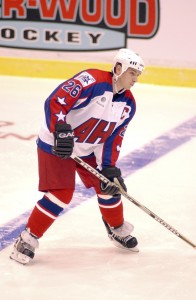When the Wilkes-Barre/Scranton Penguins started play in the American Hockey League in the 1999-2000 season, defenseman John Slaney was one of the team’s first standouts. He led the team with 60 points in just 49 games after coming to the Pittsburgh organization from the Nashville Predators.
On the eve of the AHL All-Star Game in Wilkes-Barre in 2001, Slaney was traded to the Philadelphia Flyers and finished the year with the Phantoms. He was named the winner of the Eddie Shore Award given to the league’s top defenseman and won a Calder Cup in Philadelphia in 2005.

Slaney appeared in five AHL All-Star Games overall and finished his playing career in Europe, retiring in 2011. When he left to play overseas in 2007, he was the league’s all-time scoring leader among defensemen with 519 career points. (He was surpassed by former Hershey Bears captain Bryan Helmer.)
In 2011, he made his return to the league as an assistant coach with the Portland Pirates, the AHL affiliate of the Phoenix Coyotes.
It was recently announced that Slaney would be inducted into the AHL Hall of Fame’s 2014 class at this year’s All-Star festivities in St. John’s, Newfoundland. He is also a nominee for induction in the Wilkes-Barre/Scranton Penguins Hall of Fame.
On Thursday, he did an interview with The Hockey Writers to look back on his time in Wilkes-Barre and discuss his reaction to being named to the AHL Hall of Fame.
When he first came to Wilkes-Barre, he was coming down from Pittsburgh, where he played 29 games in the 1999-00 campaign. He specifically remembers looking at Wilkes-Barre as compared to Washington D.C, as he was drafted by the Capitals in 1990. However, his first impression of the Northeast Pennsylvania area was that everyone was “very friendly.”
But things with the expansion Penguins weren’t smooth sailing. “We weren’t very good,” Slaney recalled. (The Pens finished their inaugural year with a record of 23-43-9-5 and missed the postseason.)
However, he has a lot of great memories of his teammates the first year and says he could tell the fans were devoted to the team.
“I just remember going to a Booster Club party and there were roughly 600 people there. It was a big surprise being in the AHL, as you normally get 50-60 people for that kind of thing in other cities.” He said the Booster Club gave the players gifts and a standing ovation, which took him by surprise.
Slaney said at the time, Wilkes-Barre/Scranton was made up of a lot of players beginning their professional careers out of college and that he tried to help with the transition. He especially bonded with fellow defensemen Chris Kelleher and Sven Butenschoen, as well as fan-favorite enforcer Dennis Bonvie, who also took on leadership roles that season.
Looking back on the trade prior to the AHL All-Star Game in 2001, Slaney stated he had fun at the event despite what later went down.
“You could really tell people were excited for hockey,” Slaney said. “It was really nice to have the fans together in that atmosphere.”
However, upon finding out he was going to Philly, he said it was hard to be there, especially since he had made friends with staff members such as Jeff Barrett, the current team CEO, and then-radio broadcaster Tom Grace. He also recalls saying goodbye to Barrett as he was presented with the MVP award following the game.
Slaney has kept an eye on the Penguins since he left Wilkes-Barre and said the fanbase hasn’t changed. He noted that the players are quick “to jump on” their opponent “in the first 10 minutes,” which has helped the organization build a culture of persistence and winning when the odds are against them.
The recent announcement of his AHL Hall of Fame induction was something he had never considered could happen. “I was surprised, honestly,” Slaney said. “It’s nice to have the ceremony in my home province this year.”
Asked about how he got into coaching, Slaney gave credit to the organization. “It kind of started in Wilkes-Barre.” He explained that at the time, then-coach Glenn Patrick did not have an assistant, and Slaney was injured and joined him behind the coach for select games. Eventually, he accepted the Pirates assistant job the season after he hung up his skates.
Slaney wants the fans in Wilkes-Barre to know he and his family enjoyed his time in the city, concluding the discussion by saying, “I’m happy I had the chance to play there.”